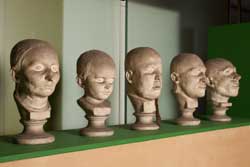Robert Noel and the ‘Science’ of Phrenology
By Nick J Booth, on 9 September 2015
This is a guest blog written by Dana Kovarik, a UCL student who has been volunteering with UCL Teaching and Research Collections over the summer holiday.
Having been introduced to UCL’s collection of Robert Noel’s phrenological busts during a literature seminar on Victorian crime (e.g., The Strange Case of Dr. Jekyll & Mr. Hyde), I found there was still much work to be done in unravelling the mysteries of the collection. While the heads have been catalogued and a book by Noel outlining the biographies of each specimen was found at the British Library, details about his life and career were slim. Upon volunteering, I was tasked by Nick Booth of UCL Museums with conducting a literature review. This involved finding articles by Noel and writings that reference his work throughout his career (roughly 1834-1880), in addition to mapping the developments of phrenology in Continental Europe during this time.
 Close
Close



